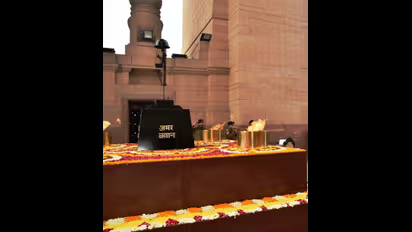Fallen soldier's rifle and helmet shifted from India Gate to War Memorial

Synopsis
Earlier, the Amar Jawan Jyoti had been shifted out of India Gate.
Months after the Amar Jawan Jyoti at India Gate was merged with the flame at the National War Memorial, the inverted rifle and helmet -- the symbolic tribute for the fallen soldiers of the 1971 India-Pakistan war, have also been shifted to the new memorial.
In a ceremony held on May 27, the armed forces installed the inverted rifle and the helmet in the midst of busts of Param Vir Chakra Awardees.
Also Read: Indian peacekeepers repulse militia strike on Congo posts
With this development, the armed forces have completed the integration of the memorial of the 1971 India-Pakistan war's fallen soldiers with National War Memorial.
"The ceremony was led by Chief of Integrated Defence Staff to the Chairman, Chiefs of Staff Committee (CISC) Air Marshal BR Krishna and attended by Adjutant General equivalents from the three Services," an official said.
During the ceremony, Air Marshal BR Krishna offered a wreath at India Gate and a final salute was also given.
Just ahead of this year's Republic Day, the Narendra Modi government merged the eternal flame of the Amar Jawan Jyoti with the National War Memorial, constructed a few hundred meters away in 2019.
The India Gate was created in 1972, months after India crushed Pakistan in the war and forced over 93,000 troops to surrender. A new country, Bangladesh, was created after the war.
Why was the inverted gun and helmet placed at India Gate?
The memorial was created in remembrance of unknown soldiers who fell in the Jessore sector during the India-Pakistan war of 1971.
The rifle is an L1A1 self-loading rifle and the four urns are each ignited with the permanent light (Jyoti) from CNG flames.
(File photo used for representative purposes)
Also Read: Major relief for veterans, Defence ministry extends pension claim deadline
Stay updated with the Breaking News Today and Latest News from across India and around the world. Get real-time updates, in-depth analysis, and comprehensive coverage of India News, World News, Indian Defence News, Kerala News, and Karnataka News. From politics to current affairs, follow every major story as it unfolds. Download the Asianet News Official App to stay informed anytime, anywhere.